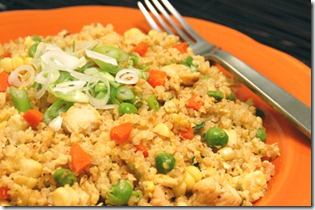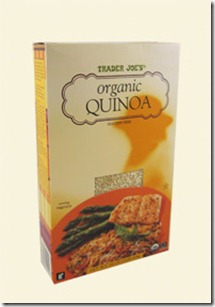Why is Quinoa (Keen-Wah) So Amazing?
 Prized as a sacred seed in the ancient Inca civilization, quinoa is still a nutritional treasure. This protein-packed food, with its nutty taste and chewy texture, is flavorful as well as filling. Quinoa is gluten free and is found at most grocery stores, it can be easily prepared and served in recipes where rice, wheat, corn or other grains are used. The benefits of quinoa are abundant and most people are not aware of the helpful role this super food can play in their health & fitness. Check it out…
Prized as a sacred seed in the ancient Inca civilization, quinoa is still a nutritional treasure. This protein-packed food, with its nutty taste and chewy texture, is flavorful as well as filling. Quinoa is gluten free and is found at most grocery stores, it can be easily prepared and served in recipes where rice, wheat, corn or other grains are used. The benefits of quinoa are abundant and most people are not aware of the helpful role this super food can play in their health & fitness. Check it out…
 1. Protein Powerhouse
1. Protein Powerhouse
Proteins are essential to the building and repair of the body’s tissues and to basic functions like growth, digestion and excretion. Quinoa has a higher protein content than wheat, barley or other major grains. One cup of quinoa has 9 grams, which trumps the protein-rich egg (6 grams). Quinoa, which contains all 8 of the essential amino acids, is a complete protein. It has become a favorite dish among vegans and vegetarians, but the benefits of it are available to anyone seeking an alternative to meat, eggs and dairy products as a protein source.
2. Dieter’s Dream
Quinoa is a satisfying, low-cholesterol source of complex carbohydrates. Rich in fiber, it’s digested slowly and has a low glycemic index, helping you steer clear of the blood-sugar roller coaster. With its chewy texture, quinoa can be eaten at a leisurely pace. Its heart-healthy polyunsaturated fats will leave you feeling full while providing more nutritional content than breads or cereals made of refined grains. Quinoa can be eaten as a breakfast food to provide long-lasting energy and help you breeze through your morning workout. A meal of vegetables and quinoa, or quinoa and beans, is a dieter’s dream: high in vitamins, minerals and protein, while low in fat and calories.
3. Internal Cleanser/Detoxifier
As a complex carbohydrate, quinoa acts an internal cleanser, easing the progress of food through the digestive tract. Used regularly in your diet, quinoa can help keep you free of constipation and bloating. Unlike more common grains such as wheat, quinoa is gluten-free and can be enjoyed by people with digestive disorders, like celiac disease. This versatile seed can be used in breads, soups or other foods where grains are a primary ingredient, offering a steady source of colon-cleansing fiber. The vitamin B and folate in quinoa also help the liver in its role of eliminating wastes from the body, adding to quinoa’s detoxifying properties.
4. Bone Builder
For vegans, people with lactose intolerance or those who are simply looking for non-dairy sources of this vital mineral, quinoa is a flavorful source of plant-derived calcium. Calcium builds and maintains bones and teeth, helps regulate the contraction of the heart, and facilitates nerve and muscle function. One cup of cooked quinoa contains 30 milligrams of calcium. Quinoa also contains impressive quantities of potassium, magnesium and zinc, minerals that are crucial for heart, nerve and muscle function.
5. Brain Food
A cup of cooked quinoa offers 15 percent of the U.S. Recommended Daily Allowance of iron, which helps to deliver oxygen to the blood, boosting energy and brain power. Quinoa’s vitamin B content can help keep the mind sharp, maintain brain volume and stabilize mood.
Try it for yourself, it’s not only mega nutritious but it’s extremely delicious! Here’s a link to some great recipes. ![]()





